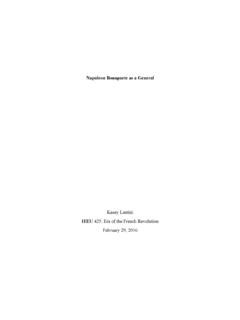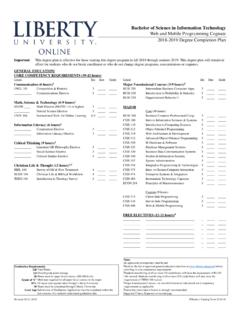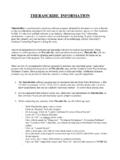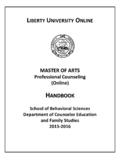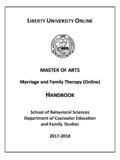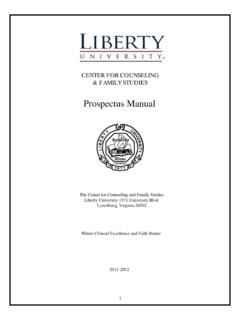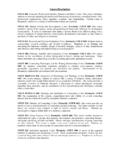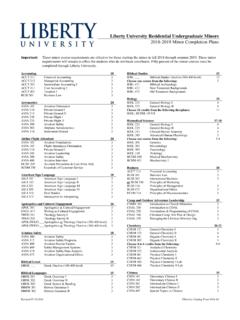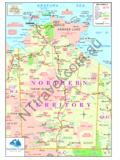Transcription of Napoleon Bonaparte as a General -AUTHOR DATE …
1 Napoleon Bonaparte as a General Kasey Lentini HIEU 425: Era of the French Revolution February 29, 2016 1 One of the most infamous figures in world history is France s Napoleon Bonaparte . As officer, General , and later emperor, he helped France to single-handedly take on the rest of Europe in war. Though he possessed numerous triumphs early on, towards the end of his career, his decline in victories becomes evident. Nonetheless, by reviewing his successes and failures as a General , Napoleon can confidently be regarded as a great commander, whose talent and sprinklings of luck assisted him on his rise to power. Napoleon s Successes Psychological Genius As General , Napoleon achieved much success through his psychological and military genius. Concerning the former, Napoleon maintained a disciplined and talented army by rallying his troops with speeches.
2 He would often appeal to soldiers emotions by citing their bravery when overcoming hardships. In one speech, he proclaimed, You forced marches without shoes, camped without brandy and often without bread. Soldiers of liberty, only republican phalanxes could have endured what you have endured ( Napoleon s Proclamation 2004). Through these emotional entreaties, Napoleon was able to push his men to their limits, knowing they would not break. Napoleon also psychologically appealed to his soldiers in a way that allowed them to achieve astonishing endeavors. During 1805, his forces completed an enormous feat that had not been attempted since the days of Hannibal. He and his men crossed the snowy, treacherous Alpine pass in just six days to surprise the Austrians ( Napoleon 2012). This illustrated the endurance that Napoleon instilled in his men mentally and physically.
3 Finally, Napoleon emotionally rallied his men by example. He led the assault in numerous battles, including Toulon, Arcola, and Lutzen. In one instance at La Rothiere in 1814, Napoleon exposed himself 2 recklessly to artillery fire in order to animate his wavering young troops (Smith, Nu ez, and Olszewski 2008a). The risks he took on the battlefield encouraged the morale of his troops, ensuring success. Military Genius In addition to his emotional appeals, Napoleon s accomplishments as a General also relied on his military expertise. In his military career, Napoleon won around fifty battles (Smith, Nu ez, and Olszewski 2008a). He won his victories by using strategies that allowed him to take advantage of enemy forces. For instance, he brought Europe closer to modern warfare by mobilizing the largest army Europe had seen up to that point. By the 1790s, France possessed an army of million (Smith, Nu ez, and Olszewski 2008a).
4 Also, Napoleon s military genius shone in the Italian campaigns. Upon his appointment to commander of the Army of Italy, he was able to turn the once neglected force into an Austrian-defeating machine that won numerous battles in just the first week of fighting (Smith, Nu ez, and Olszewski 2006). Further, the decisiveness of his battles illustrated Napoleon s brilliancy on the battlefield, especially at his greatest victory at Austerlitz. Even with inferior numbers, Napoleon inflicted more than three times as many casualties on the allies at Austerlitz. His victory caused Austria to loose vital footholds in Germany and Italy as a result of the Peace of Pressburg after the battle (Markham 2010, 116). Overall, Napoleon s successes significantly outweighed his defeats. Napoleon s Defeats Failed Battles Nonetheless, Napoleon s defeats were not nonexistent. As a military commander, he did not always make the decisions that would have brought the best outcome in his battles.
5 His first major defeat in the Battle of Aspern-Essling especially demonstrates this idea. In 1809, 3 Napoleon underestimated Austrian Archduke Charles forces. This miscalculation led him to fight Charles 100,000 men with his 36,000 men, resulting with a sound defeat (Markham 2010, 176). Napoleon did not possess much success in Spain either. He faced revolts and guerrilla warfare from Spaniards after replacing their monarch with his brother Joseph, whom he later replaced again with the original Spanish monarch. The General had made the mistake of assuming that Spain s middle class would gladly accept French reforms (Markham 2010, 165). Multiple-Front War Fighting a war on multiple fronts also contributed to these Spanish debacles and a later failure in Russia. Earlier, Napoleon had removed troops from Spain in order to focus on preparations for a Russian invasion (Smith, Nu ez, and Olszewski 2008a).
6 By spreading his forces too thin, he lost control over some of his power. As his most famous disaster, Napoleon failed immensely during his attempt to invade Russia in 1812. By the end of it, he had lost 600,000 men and never regained his greatness (Smith, Nu ez, and Olszewski 2008b). Truly, most of his defeats during his military career occurred after the invasion of Russia, demonstrating that even an accomplished General is prone to mistakes. Napoleon s Legacy Promotion through Talent Concerning how to regard Napoleon , his military career does afford him the title of a great commander, though he did receive some help along the way. He was one of the greatest generals because of his military genius. This idea is evidenced by how others took notice of him for his talent, not necessarily his background or status. For instance, his earlier victory over the Piedmontese at Dego caused his commander to boast about Napoleon to the Committee of Public Safety.
7 The commander asserted that, it is to the ability of the General of artillery that I 4 success (Markham 2010, 15). Therefore, Napoleon s expertise in artillery caused him to gain initial recognition from his superiors. Further, though many of Napoleon s opponents did take notice of his political connections, overall, most of his promotions were based on success on the battlefield. For example, Napoleon was met with contempt when he was appointed to take command of the Army of Italy. This was because his close political acquaintance, Paul Barras, became a Director in the French government, which naturally spread rumors of favoritism (Markham 2010, 19). In reality, his appointment was based purely on military accomplishments. Attributing the most to Napoleon s military prominence is his legacy that continues on after his death. Significantly, military academies across the globe, including West Point, would teach their students French so that they could read his books about military tactics.
8 His campaigns formed the basis of military education throughout the western world (Smith, Nu ez, and Olszewski 2006). Napoleon s strategies, as mentioned, also helped thrust Europe into modern warfare. Though he did not necessarily focus on creating new additions for military reform, the way he understood, modified, and executed mass warfare made him a more modern and impressive tactician than others of his time (Smith, Nu ez, and Olszewski 2006). His achievements in the art of warfare certainly immortalize him as an exceptional commander. Promotion through Connections Although, in some instances, Napoleon can be considered lucky in the sense that he had many political connections that assisted him during his rise of command. These connections though would simply provide Napoleon with an opportunity to prove his military excellence, rather than appoint an unqualified favorite to certain positions.
9 Early in his career, he came to admire Augustin Robespierre whom, through patronage, appointed Napoleon as the operational planner of the Army of Italy. After this appointment, Napoleon assisted French forces in winning 5 victories at Oneglia and Saorgio (Markham 2010, 14). While this promotion was through political patronage, it allowed him to demonstrate his military capabilities during these acquisitions of vital ports. Another instance of Napoleon s political connections granting him career success was in 1795. During this time, the French government became suspicious of English ties to Corsica, resulting with them recalling all Corsican officers from the Army of Italy back to France, where the government could keep an eye on them (Markham 2010, 15). Napoleon viewed the recall as an insulting demotion. Through connections in the Committee of Public Safety though, Napoleon was transferred to the Topographical Bureau of the Committee instead of to France.
10 The Committee was interested in Napoleon s plans for conquering Italy and Lombardy (Markham 2010, 15). Again, though his opportunity to remain in Italy was attributed to political connections, it allowed him to carry out his plans for Italy, which were successful. Also, though these contacts no doubt assisted Napoleon as he rose through the ranks, the main reason he was noticed by superiors in the first place, in many cases, was because of his military talents that later distinguished him as a great military commander. Overall, Napoleon Bonaparte was an excellent and impressive militarist. He exceled through his military ranks, albeit with assistance at times, at a significant rate. Though receiving defeats and making mistakes occasionally, his career as military commander of the French forces consisted of mostly decisive victories. These victories demonstrated the military genius that allowed Napoleon to receive recognition and success.
